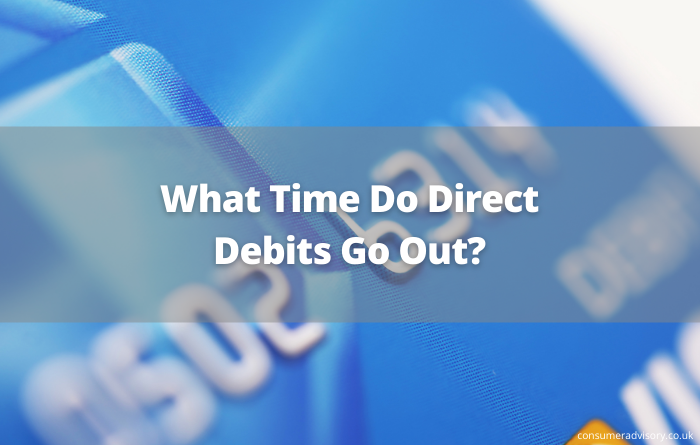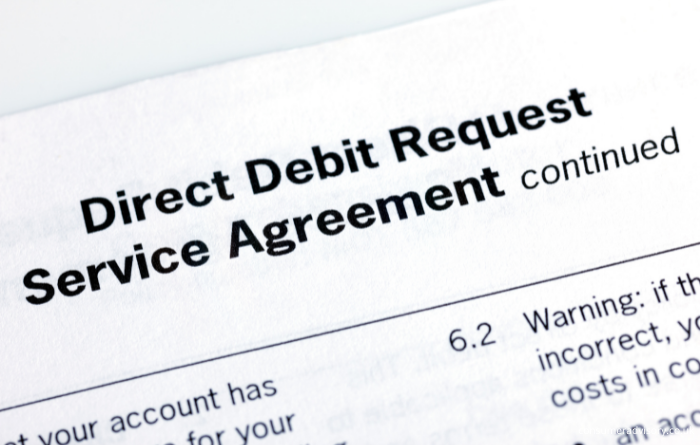

What time do direct debits go out? Whilst a direct debit will leave your bank on a specified date, there is no set time that a direct debit will be taken. This means that it can be taken at any time during the day, from early in the morning to late at night.
In this article, we’ll explore direct debits in more detail, from who can set one up to how you can request to change your direct debit mandate.
A direct debit is a payment system used by many financial institutions and organisations. Here’s how it works –
You have an account with a bank or another business, such as a utility company or even your gym.
What you may not know is that the bank has set up a direct debit from your account to pay for your service, which you pay for every month. It’s an easy and convenient way to make regular payments, but you’ll need to weigh up the pros and cons before deciding to set up a direct debit.
If you have a bank account, it’s likely that you’ll receive regular payments from a variety of sources – whether this is money from your salary or an insurance policy – and it’s likely that at least some of these payments will be taken using direct debits.
The person or company that pays you this money may want to take payment in a number of different ways and, whilst they could simply ask for your account details, this would give them full access to your bank account and it’s unlikely that they’d want to use such sensitive information. This means that they’ll set up a direct debit with your bank instead, which enables them to take payments automatically without needing to keep changing their account details.
Furthermore, if you’re the person setting the direct debits up, you don’t need to worry about paying bills and can simply leave it in your bank’s hands. All that you need to do is give your bank the correct details for your account and, in most cases, you’ll be able to choose which day of the month that payments are taken.
You might think that direct debits are always paid at midnight. However, this is a common misconception. The truth is, a direct debit can be taken at any time of day, either on the payment date or the next working day if the payment date falls on a weekend or bank holiday.
The most common time for a direct debit to leave your account is in the early hours of the morning, between 1am and 7am. But it’s important to be aware that this is not always the case.

Setting up a direct debit is actually very easy. Simply contact whoever makes payment to you (your employer or insurance company, for example), and they’ll either be able to arrange it themselves or give you the correct information that you need.
At this point, you’ll need to know your bank account number, sort code and (if applicable) your unique identifier. For example, if your unique identifier is your postcode, then this will normally start with 9 (such as SW1A 2AA) and your unique identifier for your personal bank account will be 6 digits long (such as 6659 6297).
Once you’ve given this information to whoever wants to set up the direct debit, they’ll ask you what day of the month that payments should be taken. This is commonly done by providing options such as ‘the 15th of every month’ or ‘the 3rd Friday of the month’.
Once you’ve agreed on a date, your bank will set up the direct debit and, if it goes to an electronic banking service such as BACS or Faster Payments, payments will be taken at least every night. If you’re making payments yourself, payments are taken on the day that you’ve selected.
If someone has set up a direct debit with your bank and you then realise that you no longer want to part with the money, there is a simple way to stop it from being taken. This will be as easy as contacting the payer and asking them to cancel it. If they’re unable to do this themselves, then your bank will be able to help you by telling you how long the payment has left before it’s due or cancelling it entirely.
At this point, if there are any funds in your account that would cover the direct debit, they’ll go through straight away. If there aren’t enough funds in your account, the direct debit will go through as normal and you’ll be charged an overdraft fee.
Direct debits are not taken on a weekend. Instead, they will usually be taken on the next working day. This will usually be the Monday, but in the case of a bank holiday it could also be a Tuesday. So, if your direct debit is due to be taken on Saturday 27th November, it will instead leave your bank on Monday 29th November.
If you’ve ever looked at how to pay bills, standing orders and direct debits, chances are you’ll have noticed that they seem very similar. In fact, the terms ‘standing order’ and ‘direct debit’ are often used interchangeably in popular culture. However, there is are some important differences between the two when it comes to taking payments automatically.
The main difference is that a standing order will generally be made for a single, specified amount of money and will remain the same until you cancel it. For example, if your council tax bill is £120 per month then you could set up a standing order to pay this directly from your bank account on the fifth of every month.
In contrast, a direct debit is an instruction to your bank to pay a company on a certain date, but the amount that is paid can vary on each payment. For example, if you are on a variable energy rate, you may find that your gas and electric payments are different every month. A direct debit will automatically make the payment on your behalf on your specified date, no matter what the amount.
Direct debit guarantee can help to protect you against fraudulent transactions in any circumstances. If direct debits are not paid by you right now you get no more refunds from the banks. To file a claim you need to contact a bank and you will be charged a fee based refund if their error caused the problem or they made a payment from the bank. You are entitled to cancel all debits under the guarantee. The order must be made 10 working days in advance of the payment. You may get less notification if something is agreed beforehand. This can always happen 10-days before the payment is due.

You might have heard of direct debits being taken twice. These types of errors are rare and direct debits are collected mostly without problems.
In the rare exception of direct debit taken twice or the same mistake made you are protected via the direct bank guarantee and should receive a free refund from your bank or building society.
Direct debits are processed by computer, so there is no way of knowing whether you have the funds in your account to pay the money. If the amount cannot be paid due to insufficient funds it will bounce back as unpaid. The direct debit will then be cancelled and you may have to pay a fee.
If the company that issued the direct debit is a member of a bank guarantee scheme, they will send you notification of the unpaid amount. You should contact them as soon as possible to explain why their payment was not made and ask for it to be processed again without a fee.
Direct debits cannot be taken early. They will always be collected on your specified payment date which is determined by the company taking the payment. The only way that they can take a payment early is with your consent and it must be agreed upon beforehand.
However, a direct debit may be taken late, after your specified payment date. This usually happens if the payment date falls on a weekend or bank holiday. If this is the case, the direct debit will usually be taken from your account on the next working day.
Direct debits are automatically processed on their specified payment date by computer. If the payment date falls on a weekend or bank holiday, it will be taken from your account on the next working day instead. However, you may find that certain banks and building societies allow direct debit payments to be taken before 10am. If this happens, the payment will be taken one working day before the payment date.
If you want to cancel a direct debit, then you will need to contact your bank or building society. Usually, they can cancel it immediately and write confirmation of this onto your account. This confirmation must be received by the company that initiated the direct debit within seven working days of the cancellation. If you cancel your direct debit, it will not affect any standing orders or recurring payments that may be linked to it.
Direct debits are an extremely useful method of payment, especially for household bills. If you are prone to forgetting to pay your monthly bills, direct debits can be very valuable.
In this article, we’ve explained what time do direct debits go out, as well as answering some of the most commonly asked questions about direct debits.